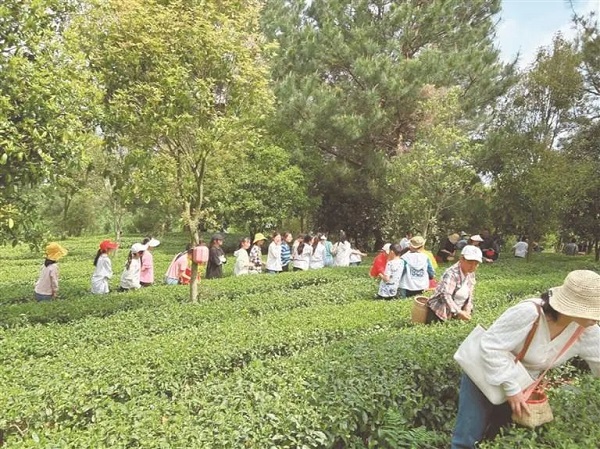Ancient tea trees brew green development in Huaxi

Tourists pick tea leaves in Jiuan. [Photo/ddcpc website]
With over 54,000 ancient tea trees nurtured by fertile soil, Jiuan township in Huaxi district, Guiyang, capital of Southwest China's Guizhou province, has turned to its ancient tea resources to cultivate a thriving tea industry.
In 2011, the permanent closure of its last coal mine ended two centuries of mining history. Miners began transitioning into a new role: tea farmers.
Through the "leading enterprise + cooperatives + farmers" cooperation model, the rare ancient tea tree grove gradually regained its glory.
Today, three modern production lines of green tea, black tea and matcha operate around the clock. Renowned tea brands reach global markets, with annual tea output hitting 2.5 million kilograms and annual output value nearing 100 million yuan ($13.95 million). This verdant industry enriches over 1,600 households and 3,700 villagers, boosting per capita annual income by more than 10,000 yuan.
In 2022, Huaxi was designated a national "lucid waters and lush mountains are invaluable assets" practice and innovation base, with Jiuan as its brightest star.
The aroma of tea lures visitors, spurring the creation of rustic tea-themed inns. Creative tea-infused delicacies – black tea rice, tea-scented omelets, chicken stewed with tea blossoms, and tea-braised pork – immerse travelers in millennia of tea culture.
Anchored by ancient tea plantations and the vast Jiulongshan Tea Garden, attractions like the Tea Charm Mountain Retreat, Xinzhai Beautiful Village, Mangfu Art Center, and Tea Exhibition Hall form a fragrant rural tourism trail, where every step breathes life into the legacy of tea.
Presented by China Daily.
黔ICP备05001922号-3
